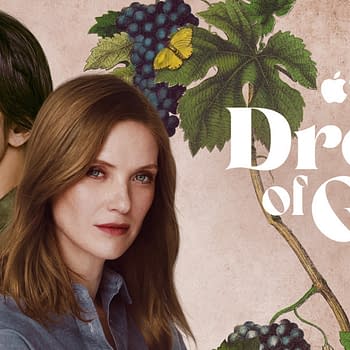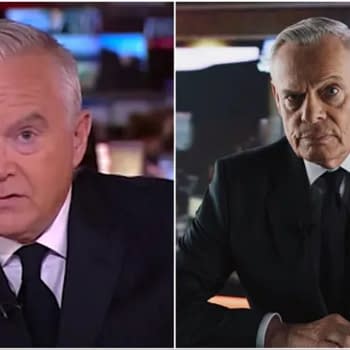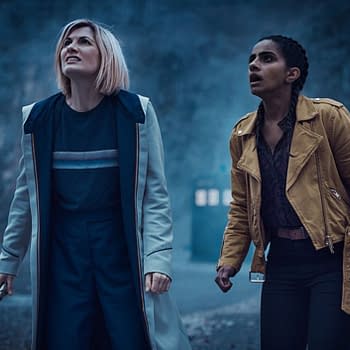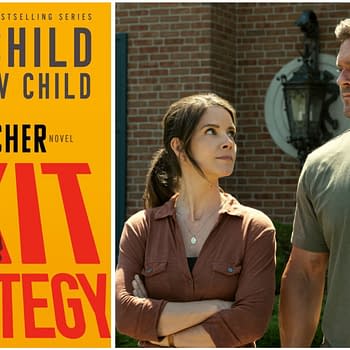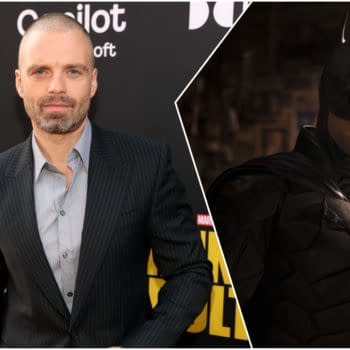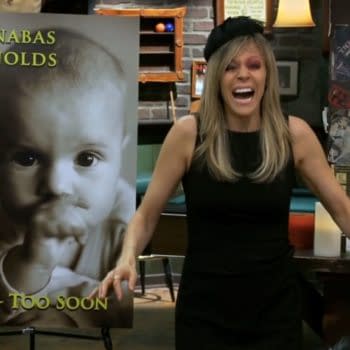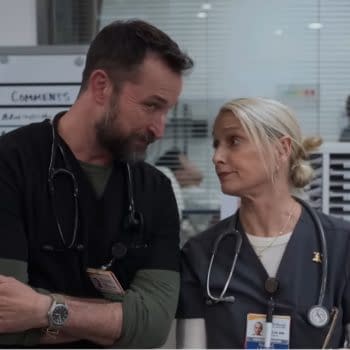Posted in: BBC, Doctor Who, Trailer, TV | Tagged: 13th doctor, action, Arachnids in the UK, bbc, bbc america, bbc one, bleeding cool, cable, Demons of the Punjab, doctor, doctor who, drama, it takes you away, jodie whittaker, Kerblam, rosa, sci-fi, science fiction, series 11, streaming, tardis, television, The Battle of Ranskoor Av Kolos, The Doctor, The Ghost Monument, The Tsuranga Conundrum, The Witchhunters, The Woman Who Fell to Earth, thriller, Time Lord, time travel, tv
Doctor Who Series 11: A Darker Season Than You First Thought
Doctor Who Series 11 feels different from the previous seasons because it feels more like a social drama, there's less continuity-heavy lore, the stories aren't high in the "cosmic universe-in-danger sense" and sometimes feels slighter than before.
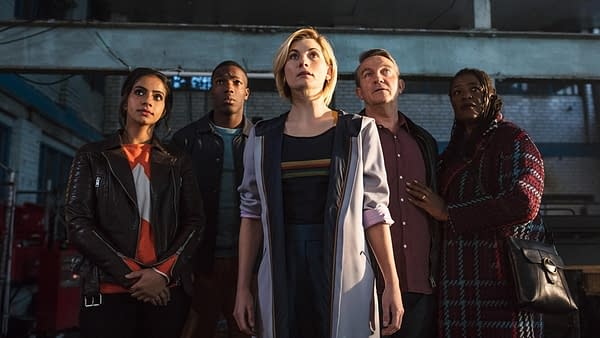
But there are moments from this season that are loads darker than they first appear – here's a look at some moments you might have missed:
'The Woman Who Fell to Earth' – How did so many people miss that the Doctor straight-up killed Tzim Sha, or "Tim Shaw"? I keep seeing people write that he got off easy because he teleported back to his home planet. Five DNA bombs detonated inside his body. Do people not understand that his DNA was destroyed in his body and all his organs basically underway catastrophic failure? The "Tim Shaw" that ends up back on his home planet is either a very messy corpse or a puddle of goo.
'The Ghost Monument' – The Doctor and her friends help Angstrom and Ipso survive and win the race but still get abandoned. This is the first sign the universe in series 11 is harsher and more unfair and the Doctor is less in control than before. It's a universe of class divide and the strong preying on the weak, even more than previous seasons. Steven Moffat liked to write the Doctor as a god-like hero who has thought of everything. This Doctor is at the universe's mercy as everyone else.
'Rosa' – Some viewers keep thinking Krasko would come back as a villain again in a future episode. I have my doubts. He's not interesting enough to come back. He was just there as a plot device to give the gang a reason to interact with Rosa Parks and make sure she gets on the bus. He has no personality beyond 'racist jerk', a representation of the Alt-Right creeps out there who are complaining about this show now.
And it looks like Ryan killed him. Ryan sent him as far back in time as possible without any technology on him. He's been reliant on his time tech and he has none. He might also have ended up so far back in time that the air isn't breathable and the land is still lava. He could have died the moment he materialized. I could be totally wrong and he might come back in the finale. We'll find out soon enough.
'Arachnids in the UK' – The Doctor locks the giant spider's brood in Trump-alike tycoon Robertson's safe room so they'll eat up the rations until they run out and starve to death. Robertson shoots the giant mother spider not because he wanted to put it out of its misery – he wanted to put it out of his misery because he hates spiders. What is the more humane way of killing spiders here? To let them slowly starve to death when they run out of food in a room or to shoot a dying spider before it dies a slow death from suffocation?
'The Tsuranga Conundrum' – It's implied that General Eve's robot partner Ronan was also her lover. After she dies, Ronan and her brother Durkas bond and mourn, and Ronan declares that his term of service is over. For a robot companion, that means termination. Durkas doesn't ask Ronan to become his robot partner. It's implied that robot partners are bonded to pilots for life and are expected to be destroyed when their human partners die.
'Demons of the Punjab' – Something is underplayed in this story, which is that Yaz' desire to find out her grandmother's secret is what causes the creation of her family all along. If Moffat or Russell T. Davies was scripting this episode, they would have hammered that point more. If the Doctor hadn't taken her back to 1947, her grandmother would have died without ever marrying her second husband or immigrating to Britain, and Yaz' family would never have come into being. The Doctor becomes a plot device in Yaz and her grandmother's story here. They closed a loop. They weren't going to prevent Partition or the massacre of thousands in sectarian violence, but the Doctor and Yaz make sure Yaz' grandmother's first husband dies in order for the history of Yaz' family to happen.
'Kerblam!' – Not enough fuss was made that the Kerblam AI murdered an innocent woman. Sure, it did it to try to shock the luddite terrorist into not committing mass murder and failed, but no one really mentioned it again… except at the end when the senior executives announced that the AI had been temporarily suspended pending new policy to bring in more humans to work at Kerblam. What was glossed over was that an AI made a moral calculation to sacrifice one life to try to save millions of lives. I wonder why the writers didn't have the executives declare that new policy to bring in more humans to the company was because the company AI murdered someone!
'The Witchhunters' – The Doctor and her fam saved the planet from woody aliens but did not end the witch trials. King James emerged from his encounter with the Doctor even more convinced of the existence of witchcraft than ever. Witch hunts continued in England for more than another 100 years. That means hundreds more people die after they left.
'It Takes You Away' – Several viewers asked why the Solitract didn't take on the form of a lost loved one from the Doctor's past to appear before her. It picked a frog because it saw in Graham's memories that Grace was delighted by the frog pendant he bought her. To the Solitract, the frog is a symbol of love. It chose to appear as a frog to the Doctor as an expression of its love and their new friendship. Jodie Whittaker played the scene as a break-up. The Doctor leaves the Solitract with the memory of their short friendship to sustain it for eternity. A human goes insane from being alone for too long. How do we know an eternity of solitude wouldn't drive a sentient universe insane and it might implode as an act of self-destruction and suicide? And when it happens, no one will be there to see it. The implications are pretty dark when you stop and think about it, folks.
Too bad I haven't seen the finale 'The Battle of Ranskoor Av Kolos' yet. I'm curious about what downbeat and pessimistic bits Chris Chibnall puts into the background of the story to cap off his first season as showrunner.



